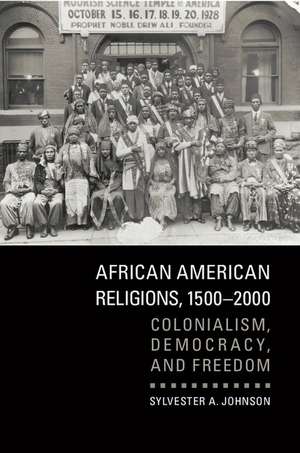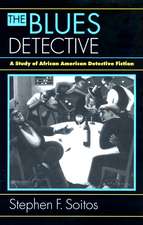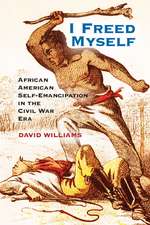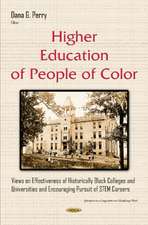African American Religions, 1500–2000: Colonialism, Democracy, and Freedom
Autor Sylvester A. Johnsonen Limba Engleză Paperback – 5 aug 2015
| Toate formatele și edițiile | Preț | Express |
|---|---|---|
| Paperback (1) | 205.65 lei 3-5 săpt. | |
| Cambridge University Press – 5 aug 2015 | 205.65 lei 3-5 săpt. | |
| Hardback (1) | 740.52 lei 6-8 săpt. | |
| Cambridge University Press – 5 aug 2015 | 740.52 lei 6-8 săpt. |
Preț: 205.65 lei
Nou
Puncte Express: 308
Preț estimativ în valută:
39.36€ • 40.98$ • 33.26£
39.36€ • 40.98$ • 33.26£
Carte disponibilă
Livrare economică 17 februarie-03 martie
Preluare comenzi: 021 569.72.76
Specificații
ISBN-13: 9780521157001
ISBN-10: 0521157005
Pagini: 438
Ilustrații: 4 b/w illus.
Dimensiuni: 150 x 226 x 25 mm
Greutate: 0.59 kg
Editura: Cambridge University Press
Colecția Cambridge University Press
Locul publicării:New York, United States
ISBN-10: 0521157005
Pagini: 438
Ilustrații: 4 b/w illus.
Dimensiuni: 150 x 226 x 25 mm
Greutate: 0.59 kg
Editura: Cambridge University Press
Colecția Cambridge University Press
Locul publicării:New York, United States
Cuprins
Introduction; 1. Black Atlantic religion and Afro-European commerce; 2. On religious matters; 3. Colonial governance and religious subjectivity; 4. Stateless bodies, African missions, and the Black Christian settler colony; 5. Black political theology, white redemption, and soldiers for empire; 6. Garveyism, anticolonialism, and state repression of Black religions; 7. Fundamentalism, counterintelligence, and the 'negro rebellion'; 8. Black religion, the security state, and the racialization of Islam; 9. Conclusion. Black religion, freedom, and colonialism.
Recenzii
'Not a conventional survey of African American religion, which might trace religious origins and developments, this book is a groundbreaking exploration of the conditions of possibility for thinking about African American religion. Transatlantic empires, colonial enclosures, and political engagements, as Sylvester Johnson shows, are more than historical contexts; they are forces of religious formation. The book is an important contribution to the study of African American religion and the study of religion.' David Chidester, author of Empire of Religion: Imperialism and Comparative Religion
'Sylvester Johnson, through his exploration of the economies of space, time, and discourse, reorders the materialities of the Atlantic world formation, allowing for a fresh interpretation of African Americans, religion, and modernity itself. In this work, African American diasporic religion can be seen as an epistemological probe enabling a critique of regnant notions while opening up new sources of data.' Charles H. Long, Professor Emeritus, University of California, Santa Barbara
'Sylvester Johnson's book provides a new interpretation of the beginning and formation of what has often been termed a slave religion, but in a more refreshing and in-depth manner than previous books on the subject. This is an interdisciplinary work that bridges the gap between the old African spirituality on the slave coasts of Africa and the emerging New World religions practiced by Africans across the Atlantic. By so doing, Johnson has given new meaning to what African diaspora religions should mean in the discipline. The historical context in which he places the impact of colonialism, democracy, and freedom in the formation of slave religions surpasses what is available in the literature. This work will appeal to many disciplines, including religion, history, and African American and African studies.' Jacob Olupona, Harvard University, Massachusetts
'This superb book locates African American religions in the context of the development of colonial empire in the Atlantic world. By placing religion in the conflicted network of geopolitics, economic exploitation, and ideological struggles over domination, race, and freedom, Johnson develops a fresh and sophisticated narrative of the history of black religion, freedom, and colonialism. This book will be mandatory reading for anyone interested in African American and Atlantic world history.' Albert J. Raboteau, author of Slave Religion
'In this brilliant work Johnson offers an innovative examination and interpretation of the intersection of African American religions, colonialism, democracy, and freedom. He approaches the subject chronologically, in three time periods … A major contribution to the literature on African American religions, this book is a tour de force. Summing up: essential. Upper-division undergraduates through faculty.' L. H. Mamiya, Choice
'Johnson's book provides a persuasive, innovative, and broader global framework to understand African American religions that should be required reading for current and future scholars of black religion and American religious history.' Julius H. Bailey, The American Historical Review
'… Johnson's African American Religions, 1500–2000 is a work of great clarity, passion and power that deserves deep and fervent reading for years to come.' Juan M. Floyd-Thomas, Black Theology
'A century of work in slavery studies and critical race theory has exposed the terrors that underwrite American democratic freedom. Johnson's ambitious text steps into this multifaceted conversation … and reinterprets the history of African American religion through the lens of its central arguments …' Lucia Hulsether, Religious Studies Review
'Sylvester Johnson, through his exploration of the economies of space, time, and discourse, reorders the materialities of the Atlantic world formation, allowing for a fresh interpretation of African Americans, religion, and modernity itself. In this work, African American diasporic religion can be seen as an epistemological probe enabling a critique of regnant notions while opening up new sources of data.' Charles H. Long, Professor Emeritus, University of California, Santa Barbara
'Sylvester Johnson's book provides a new interpretation of the beginning and formation of what has often been termed a slave religion, but in a more refreshing and in-depth manner than previous books on the subject. This is an interdisciplinary work that bridges the gap between the old African spirituality on the slave coasts of Africa and the emerging New World religions practiced by Africans across the Atlantic. By so doing, Johnson has given new meaning to what African diaspora religions should mean in the discipline. The historical context in which he places the impact of colonialism, democracy, and freedom in the formation of slave religions surpasses what is available in the literature. This work will appeal to many disciplines, including religion, history, and African American and African studies.' Jacob Olupona, Harvard University, Massachusetts
'This superb book locates African American religions in the context of the development of colonial empire in the Atlantic world. By placing religion in the conflicted network of geopolitics, economic exploitation, and ideological struggles over domination, race, and freedom, Johnson develops a fresh and sophisticated narrative of the history of black religion, freedom, and colonialism. This book will be mandatory reading for anyone interested in African American and Atlantic world history.' Albert J. Raboteau, author of Slave Religion
'In this brilliant work Johnson offers an innovative examination and interpretation of the intersection of African American religions, colonialism, democracy, and freedom. He approaches the subject chronologically, in three time periods … A major contribution to the literature on African American religions, this book is a tour de force. Summing up: essential. Upper-division undergraduates through faculty.' L. H. Mamiya, Choice
'Johnson's book provides a persuasive, innovative, and broader global framework to understand African American religions that should be required reading for current and future scholars of black religion and American religious history.' Julius H. Bailey, The American Historical Review
'… Johnson's African American Religions, 1500–2000 is a work of great clarity, passion and power that deserves deep and fervent reading for years to come.' Juan M. Floyd-Thomas, Black Theology
'A century of work in slavery studies and critical race theory has exposed the terrors that underwrite American democratic freedom. Johnson's ambitious text steps into this multifaceted conversation … and reinterprets the history of African American religion through the lens of its central arguments …' Lucia Hulsether, Religious Studies Review
Notă biografică
Descriere
A rich account of the long history of Black religion from the dawn of Western colonialism to the rise of the national security paradigm.















